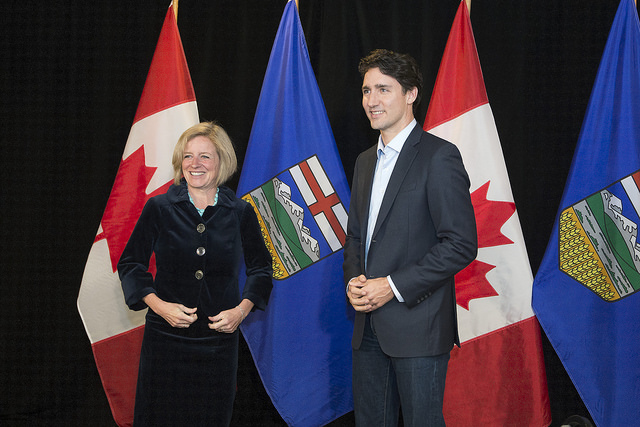Like this article? rabble is reader-supported journalism. Chip in to keep stories like these coming.
Justin Trudeau is holding a three-day cabinet retreat in the mountain resort of Kananaskis, an hour west of Calgary. Alberta premier Rachel Notley made a presentation to Liberal ministers on Sunday, and held a private meeting with the Canadian prime minister as well.
Evan Dyer of CBC reported that Notley received a standing ovation after her remarks to ministers. Notley said she highlighted the significance of the Alberta economy to Canada, and of energy exports to both Alberta and Canada.
A few days before the meeting, Rachel Notley wanted to know why “we’re acting like a bunch of villages as opposed to a nation.”
Her comment was reminiscent of one Pierre Elliott Trudeau, who, finding himself in opposition briefly in 1979-80, asked Prime Minister Joe Clark if he intended to be the head waiter for the provinces.
The Justin Trudeau approach to the environment includes complying with the Paris Accord and committing Canada to international targets — then expecting the provinces to meet them.
There is a leadership role for Ottawa and Justin Trudeau needs to recognize it. According to the Pembina Institute, by 2014 Canada was providing tax subsidies to bitumen sands production valued at over $1 billion, as much as or more than the Canadian government was receiving in revenue from the same source.
Ottawa needs to transform those bitumen subsidies into grants for the installation of solar panels and incentives to retrofit buildings.
Canadians are turning to hybrid or electric vehicles for personal transport. Ottawa should work with labour and industry to establish a timetable for the phase-out of the internal combustion engine on Canadian roads.
At the same time, working closely with Unifor, Ottawa needs to create a national transportation company to build public transit vehicles appropriate for sub-arctic climate conditions.
Notley highlighted Alberta climate change policy for the Liberal cabinet. The Alberta approach is to phase out coal production, put hard caps on methane gas emissions, and plan reductions to overall GHG emissions from oil sands production.
She had both Big Oil and Big Green in attendance for her major climate announcement prior to Paris last November, six months after her swearing-in May 24, 2015.
A bold approach to environmental protection is what NDP supporters expect from Premier Notley. An example is the abandoned oil well-to-geothermal conversion project that cuts down on methane leaks while using oil services companies to produce new, geothermal energy.
With right-wing opposition parties attacking Notley for what she had for breakfast, bringing business, labour and community groups together is key to her approach. Having to deal with barely concealed hostility in media reporting, the Alberta government is trying to reach out to the public directly.
The NDP government wants a portion of new carbon tax revenues to be re-invested in economic diversification. Following the recent Alberta budget, even an Edmonton Sun business writer praised the Notley approach to economic change.
As amended in 1982 — with the federal government of Pierre Trudeau leading the way — the Canadian Constitution assigns natural resources rights to Alberta and Saskatchewan (the other provinces already had those rights).
Notley and her government are aware that outside North America, oil and gas are under public ownership.
The Alberta government needs to put the public ownership option on the table. There is no future shipping diluted bitumen by pipeline. The NDP government needs to commit to upgrading bitumen production in Alberta.
Alberta has important reserves of conventional oil and gas. Canada is criss-crossed with pipelines carrying natural gas and crude petroleum. This aging infrastructure needs to be updated. It would be much better for all concerned if a new West-to-East pipeline were to be publicly owned.
Canada does not need to import oil from Saudi Arabia, already under attack for its treatment of women and other human rights violations. Serving the Canadian market with domestic resources provides for greater security.
In his study Democracy in Alberta, published in 1953, the late C.B. Macpherson characterized the province as dependent on outside forces that threatened its prosperity, from violent storms that threatened crops, to eastern bankers milking producers, to commodity speculators undermining farm finance.
Notley expects Canada to step up in support of Alberta energy, and she is making it abundantly clear to any and all that she intends to champion her province with Ottawa.
Duncan Cameron is former president of rabble.ca and writes a weekly column on politics and current affairs.
Photo: Chris Schwarz/Premier of Alberta/flickr
Like this article? rabble is reader-supported journalism. Chip in to keep stories like these coming.



